Once in the Sunny Southland he found the Harrison
Gray Otis estate in the San Fernando Valley for sale. This would
become the site of his very own city, named after Tarzan as Tarzana.
The location of over five hundred acres was obtained for a song, only a
hundred thousand dollars. Along with the land went a magnificent
house with spectacular gardens such as one might expect the publisher of
the Los Angeles Times to build.
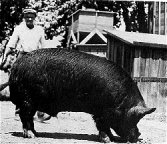
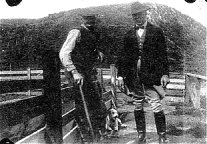
ERB and Emma moved in. ERB who said as he left
Chicago that he was going to raise prize Berkshire hogs in LA did just
that as well as nearly every other domestic animal while he planted fields
and orchards with every imaginable plant.
There was only one thing he forgot: How
to make a profit. As a gentleman farmer his spread was all expense
and no return. But that was in the future.
One is always amazed at Burroughs ability to
continue writing amidst all these distractions. How did he find time
to keep up on the world, expand his intellectual horizons, manage this
estate and just relax and enjoy it as he apparently did. He must
have been an efficiency expert to be able to manage his time so well.
All of the above conditions would be reflected
in The Girl From Hollywood when he finished writing it. What
a story.
II.
Of all the writers of his era Burroughs was
the most versatile.
He wrote in more genres than perhaps any other writer: science fiction,
fantasy and literary, Westerns, Indian as well as several sub-genres.
The European States, England, France, Germany etc. all had national literatures
centered around a national capitol, London In England, Paris in France,
Berlin in Germany and so on. The US was much more diverse.
There really was no national writing. While Washington DC was the
political capitol, the cultural capitols were New York City, Chicago and
later Los Angeles. The South as a region had a strong literary tradition
as well as the New England Yankee to some extent. The frontier was
passing but the Western was a strong literary genre.
Locations such as Detroit, Minneapolis or Wisconsin
all lack strong literary traditions even with ample material to write about.
ERB included NYC material in his novels although he never wrote a NYC novel.
He did turn out a couple strong Chicago novels while being basically a
Chicago writer.
In the novel under consideration he turns his
hand to the Los Angeles novel as well as the sub-sub-genre of the Hollywood
novel. Some very fine writers have worked the Los Angeles field which
like NYC and Chicago is intrinsically interesting. Raymond Chandler's
30s and 40s and 50s portraits of LA are quite gorgeous. Perhaps Harry
Leon Wilson's Merton
Of The Movies was the first really significant Hollywood novel.
Famous in its time, a copy was lodged n ERB's library as well as Wilson's
Ruggles
Of Red Gap which became a popular movie.
Burroughs was early aware of the appeal of
the movies. Perhaps because of the success of his intellectual property,
Tarzan, for which there was an established demand which produced big money
for ERB, he thought scenario writing, as it was called in the silents,
was his forte. Always one to dissipate his energies rather than concentrating
on the matters at hand he wasted time and effort submitting scenarios that
were always rejected. Scenario writing required different skills
than novel writing. However it seems that Burroughs books after 1917-18
appear to have been written in a style with the movies in mind.
Such is the case with The Efficiency Expert
which is carefully developed in a sequence of scenes which might easily
be translated to the screen. So also is the case with The Girl
From Hollywood. The developmental sequences can easily be visualized
as a silent film or even as a talkie; talkies would make their appearance
a scant five years after the novel was written.
If the literati disparaged Burroughs as a novelist
the movie going public had no such qualms as the film
of Tarzan was advertised as the wonder story of the century.
So while Tarzan and Burroughs were sneered
at in Chicago both were bankable in Hollywood. Money talks; BS walks.
Big money led to major excesses. Most
if not all the owners, producers, directors and actors had been small time
people before the movies. Men who owned studios like Samuel Goldwyn
could barely speak English having stepped off the boat onto Ellis Island
from hard to pronounce places in the Pale Of Settlement mere years before.
Former street car conductors and what not with an eye for the main chance
found it in the movies. Neal Gabler in his excellent 'An Empire
Of Their Own' relates how the immigrants from the Pale created Hollywood
in their own image - The Porn Capital Of The World. When immigrants
built America they left more than a few rough spots.
The stage when unregulated in any country or
time has always tended toward the ribald and obscene. Now with huge
salaries the formerly penniless indulged their appetites to the fullest.
Almost from the beginning the need for regulation of the films was evident
as the movies migrated toward the sex shows we have today. Decency
organizations sprouted as fast as the studios themselves. The period
under consideration in Girl From Hollywood was a period of excesses
characterized as others have pointed out by the Fatty Arbuckle scandal,
which was just the tip of the iceberg. Even Mack Sennett's bathing
beauties were considered scandalous.
And then there were the drugs on which ERB
concentrates in many stories, especially this one. Prior to 1910
and 14 there were no restrictions on any drug. Laudanum, an opium
concoction, was used to quiet babies; Coca Cola as is well known was laced
with cocaine. Sigmund Freud went around pushing cocaine like candy
on friends and relatives. Then drugs became illegal and the black
market started up. Just prior to this story Prohibition had been
enacted so that both booze and drugs were illegal. Boy, there's a
cocktail for crime.
ERB seized on both to craft his story.
His story then is one of a lost paradise. A world had vanished before
a generation's eyes. It hadn't happened overnight. The Big
Change almost coincided with the turn of the century. Cars, planes,
phones, movies - applied electricity even, suddenly or so it must have
seemed transformed the world overnight. In 1900 there had been no
paved highways; by 1920 the network that would evolve into the Interstates
had begun.

The excitement of the Great War had probably
masked the development of the changes which were now glaringly obvious.
Flaming Youth. With the changes came changes in sexual mores encouraged
by the bizarre sexual researches of Sigmund Freud.
III.
Thus the novel opens with a vignette of what
might have been a scene from 1870 to 1890 as a man and a woman are riding
their horses through a western landscape. It might have been paradise
but Prohibition quietly intrudes into the opening scene to remind us that
paradise has been lost. The hero, Custer Pennington, is quietly admonished
by his sweetheart, the lovely and virginal, Grace Evans that he drinks
a bit too much. 'Funny,' Cus says, 'I never wanted it all that much
until it was illegal.' and thus a whole era is introduced.
The name Custer recalls times that Burroughs
would always remember fondly while Grace perhaps also refers to a time
when women were imagined to be innately pure. The foreboding of a
lost paradise is in the air. Continuity is introduced as Custer Pennington
is a Junior, the son of that fine old Virginian gentleman of a long gone
by time, the elder Custer Pennington. The Ben Cartwright or his time.
The Penningtons own a ranch which is modeled on Burroughs'
own Tarzana which he places a hundred miles from Los Angeles. Tarzana
is about forty miles or so from downtown LA. Even as Burroughs bought
his really wonderful estate Los Angeles was creeping steadily toward him
while the San Fernando Valley was quickly filling up around him.
Just as Chicago had spread rapidly across the
prairies in the nineteenth century so now the migrating tens of thousands
expanded Los Angeles like a brush fire. Harry Leon Wilson jokes about
the migration from the other states in his anecdote about Merton's 'society'
landlady who was concerned with society- the Illinois Society, the Michigan
Society, the Ohio Society, but especially with the Iowa Societies.
For some reason Iowans migrated to the sunny Southland in droves.
Makes you wonder about Iowa, doesn't it?
Also LA was becoming one of the more cosmopolitan
areas of the country as not only the Jews made it their capitol but the
dispossessed Russian nobility appeared in droves. Actors from around
the world found their way to Hollywood. In its own way it became
a clearing house for Revolutionary activities long before the thirties.
Thus from the beginning one is aware that the
Pennington's paradise is doomed. Old Virginny and Custer Pennington
are things of the past.
We slowly learn that a ranch hand, one Slick
Allen, a man of criminal proclivities, had induced Grace Evan's brother,
Guy Thackeray Evans, to store a shipment of booze stolen from an East Coast
bonded warehouse in a draw on the ranch. There was a real robbery
in New York of this magnitude also. Unbeknownst to Evans there was
also a large cache of heroin. Young Evans tries to back out but he
is already in too deep being compelled to distribute the booze. He
sells a couple bottles to Young Cus with the prophetic words: You
won't ever regret this.
Evans wants to marry Eva Pennington but as
a wastrel and aspiring writer -- he has no income. Sort of like the
Young ERB and Emma. Eve being a little on the practical side refused
to marry without some sort of financial security. Evans plans to
use the fifteen thousand coming to him as an inducement, even going so
far as to lie about selling a story to account for his having some money.
Burroughs gets in some hilarity concerning his sale of Tarzan Of The
Apes as Evans claims to have sold his story for the identical seven
hundred dollars Burroughs received. Probably he and Emma talked about
it as a thousand dollars being only three hundred short as do Guy and Eva.
Guy had wanted to move them in with his mother
but as Eva sagely remarks her parents advised her that living with parents
was unwise for newlyweds, one might live close enough to visit them daily
but not to live with them.
One imagines that ERB and Emma, who did move
in with her parents, found it a less than pleasant experience. They
did move across the street from which Emma could visit her mother daily.
Evans' middle name Thackeray is interesting
as the Penninton's are very similar to William Makepeace Thackeray's fine
old gentleman, Col. Pendennis. Old Custer is a Col. too. One
also wonders if the Guy refers to Guy de Maupassant although none of his
books were in ERB's library and he appears not to have referred to him
otherwise although he would surely have been aware of such a famous author.
Burroughs spends a chapter or two building
up scenes of idyllic family rapture out there sitting directly on top of
nature. You just know it can't last. Drugs and alcohol and
movies cast a pall over the picture. Grace Evans, the sweet and virginal,
wants to try her hand at acting; apparently she hasn't read Harry Leon
Wilson's Merton Of The Movies or she might have thought twice.
The threat of alcoholism hangs over Young Custer Pennington while Guy Thackeray
Evans is involved with Slick Allen's booze and drug scheme for which the
dirty work is done by 'Greasers', that is to say Mexicans.
Now, Burroughs is far from alone in portraying
Mexicans in a derogatory manner. His contemporary, Zane
Grey, also refers to them as Greasers while Wilson also portrays them
negatively. One must therefore assume that the generation thought
the same. The movies would introduce the 'South Of The Border' theme
with many 'Latin' actors and actresses which would soften the image but
the Mexican bandito has always been portrayed as a repulsive character.
A lovely older woman named Burke arrives in
the valley to buy an orchard. She is the mother of Shannon Burke
acting in Hollywood under the name of Gaza de Lure.
The scene now shifts to Hollywood and the story of
Shannon Burke. In Bridge And The Kid ERB hints at the notion
that he would form his own Three Musketeers consisting of Bridge, Billy
Byrne and Billy Burke. While we know Byrne and Bridge Burke never
materialized nor did the further adventures of the trio. One wonders
whether Shannon is perhaps the sister of Billy Burke. I would like
to have seen the further adventures of the three Bs - Bridge, Burke and
Byrne.
At any rate Shannon has come to Hollywood,
a beauteous young thing, to find her future on the silver screen.
After undergoing trials not too dissimilar from Wilson's Merton, Gill,
who chose as a stage name Clifford Armytage, while Shannon chose Gaza de
Lure, Shannon falls under the evil influence of Wilson Crumb, the famous
actor and director.
If Freud was promoting sex the film industry
made his vision a reality. Careers could be made or broken
on the casting couch- for both men and women. One could have a possible
career in the films or not. It was your choice. In this case
Shannon, who was her mother's daughter is holding out. For her it's marriage
or nothing. Crumb is diabolical. For him Shannon is a challenge.
He induces her to pep herself up with some cocaine which he tells her is
aspirin. How he could have used modern hypnotic drugs.
Crumb runs into Slick Allen who is quite a
character. Slick had smuggled a huge cache of heroin in from orient
as one of his other careers other than being a ranch hand was a seaman.
In disposing of his heroin he became involved with the gang which, among
other illegal activities, received the booze from the bonded warehouse.
With an assured supply of cocaine, morphine and heroin Crumb puts the now
hooked Shannon to work peddling drugs. She is still holding out for
marriage however.
Here ERB displays what seems to be some detailed
and accurate knowledge of the drug business. If his information is
true he seems to know the exact dimensions of the packets of cocaine and
how they are folded. This s pretty convincing writing. Characterization
is excellent, the details of Crumb's and Shannon's drug business are absolutely
convincing.
Shannon takes in the money for the drugs, for
which she demanded and got half the profits which is where her mother got
the money to buy the Rancho, and gives the rest to Crumb who has taken
the drugs on credit from Slick Allen. He spends the money being unable
to meet his obligation to Allen. He fobs Allen of the payment delaying
it for a couple days then asking Allen to deliver a packet of morphine
for him.
The unusually trusting Allen agrees.
Crumb then phones the police setting up Allen for the fall. Allen
is thus removed from circulation postponing the inevitable for the year
of Allen's sentence. At the same time Shannon receives a telegram
notifying her that her mother has had a heart attack which sends her up
to Pennington country.
IV.
Shannon's mother died of that heart attack.
The neighborly big-hearted Penningtons take the little girl in, never suspecting
that she is a dope addict. Now, here's a little detail ERB picked
up along the way, in the movie industry it didn't do to leave tracks running
down your arm where the camera might pick them up so Shannon injects herself
in the hip. You have to wonder where and how Burroughs picks up little
details like that.
As one might expect the wholesome family life
of the Penningtons, plus the ever changing tableaux of the Old Master Painter,
work together to make Shannon ashamed of being a dope addict. Listen
to the old Virginian wax poetic after the manner of Kipling, who Burroughs
must have in mind throughout this story:
And the first haze of
the mountains that seem to throw them first a little out of focus, to make
them a perfect background for the beautiful hills which the Supreme Artist
is placing on the canvas today. An hour from now He will paint another
masterpiece and tonight another, and forever others, with never two alike,
nor ever one that mortal man can duplicate and all for us, boy, all for
us, if we have the hearts and soul to see!
Right on, man. Kipling and Burroughs,
rah, rah, rah.
And so, as Shannon falls in love with Cus Pennington,
it takes only a week for her to break herself of her vicious habit.
ERB could have made a second fortune as a drug counselor.
The evil outside world is creeping ever closer
to Rancho Ganado. Rancho Ganado? Can you imagine a character
called Ganado Of The Apes? Grace Evans leaves for the big H to become
a movie star. As might be feared she falls into the clutches of the
ever ubiquitous Wilson Crumb who destroys her sweet and virginal innocence,
gets her addicted and pregant then causes her death by dashing her violently
against a table.
His sister's death is witnessed by brother
Guy Thackeray Evans who happens in as she lies dying. He doesn't
know who Wilson Crumb is but he intends to kill him if he finds him.
In the meantime the veil of bliss at Ganado
is ripped aside when the Young Cus is set up for booze smuggling and takes
a six month fall in the county hoosegow. Thus, all the way from that
bonded warehouse robbery in New York City the tentacles of corrupt civilization
have reached into the heart of Rancho Ganado one hundred miles from nowhere
to tear it apart. Young Custer Pennington son of the noble Virginian
scion of that great family is now a convicted felon. Not to be taken
lightly. In the eyes of the world he is convicted and therefore guilty.
Cus's arrest had been orchestrated by his enemy
Slick Allen from jail where Custer then joined him. The worst is
yet to come. Burroughs has been developing his story in an especially
orderly way. His pacing is good, no undue emphasis is placed on any
segment while no segment is scamped which is frequent with ERB.
Now the great criminal Wilson Crumb invades
Ganado itself. He and his company, KKS, (can't make anything of the
initials unless they refer somehow to the Ku Klux Klan which was emerging
at the time) need to film on the Rancho. The Old Gentleman would
have refused them but daughter Eva, enamored of the movies, persuades the
Old Cus to let them film. Little Eva, is she the same one who offered
Adam the apple? At any rate she sets the conclusion in motion.
With only a carp or two on my part which I'll
explain, Burroughs pulls this off quite decently. This book may be
the best of his realistic novels. All the threads come together.
Young Cus declares his love to Shannon but then overhears a conversation
between Crumb and Shannon which shatters his illusions sending him on a
drunken binge which transcends his noble Virginia origins. He drinks
himself into oblivion. While he is out Wilson Crumb makes a pass
at the beautiful Little Eva - shortly thereafter being murdered with the
finger being pointed very clumsily, from my point of view, at Young Custer.
ERB could have handled this better. I should think a good lawyer
could have succeeded in exonerating Cus but it was not to be. Our
man in Ganado is convicted and sentenced to death. No long appeal
processes in ERB's novels, Custer can expect to feel 'the hempen noose'
within sixty days.
Now comes the part ERB could have worked on
a little. Guy Evans was exposed by Slick Allen, who is vengifying
himself with reckless abandon, and in conjunction with his sister's
death goes insane. A stretcher if there ever was one. Little
Eva on hearing that Guy had betrayed her trust is shattered attempting
suicide by shooting herself in some undefined place. Cus is on death
row so the rural paradise has been turned upside down by encroaching civilization
becoming a rural hell.
ERB still has a surprise up his sleeve, but
its one he's used before. Of course if you haven't read everything
he's written, which few people have, the trick would be fresh with you.
You gotta remember those of us who study this stuff read with different
eyes. Well, Slick had been watching Shannon during the trial.
For a long time he's thought he recognized her from somewhere. During
the trial when her place of birth, back in Iowa or somewhere, is mentioned
it comes to him. Slick is a very well traveled guy, he's been everywhere,
man, he's been everywhere. One place he was twenty some odd years
ago was back in Iowa or wherever when he found time to impregnate Shannon's
mother. Yep, he's Shannon's long lost daddy. Bet you didn't
see that coming, did you?
Slick takes pity on his long lost darling daughter
and, even though he hates Custer Pennington, he gives her the means to
exonerate him. This ending, while plausible is very weak. Slick
got out of jail the day before Crumb was shot. Slick was going to
shoot him himself. Before he had a chance to do so, coming up on
Wilson at almost the exact moment the insane Guy Evans did he watched Guy
shoot Wilson Crumb dead. Then it was back to the sanatorium for Guy.
Was it enough for Slick that he was avenged on Crumb? Heck no.
Always a man who could think on his feet, Slick was a bad actor, he figured
out a way to pin the blame on Custer Pennington.
The denouement is really clumsy but I'll let
you read it for yourself. Armed with the information from Slick,
Shannon petitioned the Governor of the great State of California who issues
a reprieve just as the 'hempen collar' is being tightened on Young Custer's
throat. Yeah, well, I'm sure it happens but I've seen enough movies
to know it doesn't happen often. Then Shannon drops the bomb on the
shattered and beaten family that Slick was her father. Exuent omnes.
Thus ends rather lamely perhaps the finest
and most sustained realistic novel ERB wrote.
V.
Thus ends what is actually a good Hollywood
novel. In those days before they exposed themselves as the Porn Capitol
Of The World the film colony didn't take kindly to exposure of this sort.
I'm sure ERB hadn't endeared himself to the film colony for what is a brutal
if revealing look at their culture.
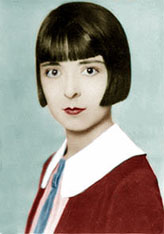 Too much is made of the sexual aspects of the colony at the time. If anything
the women retained a certain dignity while drawing down good wages unlike
Burroughs' Maggie Lynch back in Chicago. There, as Maggie said,
her employer attempted the dinner trick while offering her a meager one
dollar raise to ten dollars per week while still having to put in a ten
hour day. In Hollywood, The Flaming Girl, Colleen Moore, got twelve
thousand five hundred dollars a week which left her independent enough
to say yes or no, so long as she was box office.
Too much is made of the sexual aspects of the colony at the time. If anything
the women retained a certain dignity while drawing down good wages unlike
Burroughs' Maggie Lynch back in Chicago. There, as Maggie said,
her employer attempted the dinner trick while offering her a meager one
dollar raise to ten dollars per week while still having to put in a ten
hour day. In Hollywood, The Flaming Girl, Colleen Moore, got twelve
thousand five hundred dollars a week which left her independent enough
to say yes or no, so long as she was box office.
Of course there were the girls who never made
it like Shannon Burke and Grace Evans. Still, Burroughs makes it
clear that if Shannon had played along she would have gotten some starring
roles - the rest would have been between her and her public.
As Harry Leon Wilson points out in Merton
Of The Movies some ordinary people or even less than ordinary people
like Merton Gill came into big money and the adulation of both female and
male fans. All of a sudden there were no limits for former sales
clerks, street car conductors and whatever.
What could Fatty Arbuckle have ever been except
for the films or for that matter Mack Sennett, Harry Cohn or even the greatest
of the film people, Louis B. Mayer. They'd still be street car conductors.
So also with drugs and alcohol as with sex.
The money was there, egos were there to be exploited and massaged by drug
dealers. One is always amazed at the detailed seemingly first hand
knowledge ERB has of drugs and needles as well as the underworld.
Certainly with the advent of prohibition and the virtual legitimization
of the criminal bootlegger, speakeasies and whatnot many many people became
acquainted with the underworld as the dividing line expanded as with the
case of Burroughs' Guy Evans and Slick Allen. Without prohibition
Guy Evans would never have been drawn into criminal endeavors. Without
prohibition the idyllic Pennington lifestyle wouldn't have been destroyed
or possibly even threatened. Undoubtedly Burroughs is quietly and
subtly showing the evils of prohibition.
On the character level one notes the similarity
between Custer Pennington Jr. of this story and the character Bridge
of Bridge And The Oskaloosa Kid. Both men are of virtuous, noble
old Virginia stock. Both are falsely accused of crimes they didn't
commit for which the penalty in both cases is the hempen noose. Both
are reprieved at the last moment.
Both also bear some resemblance to Ogden Secor
of the Girl From Farris's, although if they are of the same type
then Secor was the prototype for the last two. One then asks what
there was in Burroughs' past that gave him this sense of guilt - this obsession
with being placed before juries and grand juries and being judged guilty
though innocent.
Did something happen during the 1905-13 years
which has been carefully hidden. Was ERB somehow involved in some
illegal scheme from which he barely escaped? It's possible but it
may also refer to his encounter on the street corner with John the Bully.
I can sympathize with ERB because I too had such an encounter in the second
grade, the result of which being that my original personality was murdered.
This left me with an intense feeling of guilt. For decades until
I integrated my personality you would have thought I was David Jansen playing
the Fugitive. I looked, felt and acted guilty. The guilt came
from my failure to stand up for myself which would have been very easy.
Perhaps Burroughs sense of injured innocence
and guilt are from his encounter. Perhaps he was on the verge of
annihilation when he escaped the scene. Thus he would be acting out
the earlier scene in his novels.
The same theme will appear in his fantasy novels
but those are not under discussion here.
This novel, which was published in book form
in 1923, was doing very well when, as Burroughs thought, the novel was
quashed. I have no doubt he knew what he was talking about although
I don't know why it would have been quashed. Suffice it to say it
is a very good novel while being an excellent contribution to the Hollywood
genre while also being historically significant. If you haven't read
it yet, do so. You'll enjoy it.
When Earth's last picture is painted
and the tubes are twisted and dried,
When the oldest colours have faded,
and the youngest critic has died,
We shall rest, and, faith, we shall
need it -- lie down for an aeon or two,
Till the Master of All Good Workmen
shall put us to work anew.
And those that were good shall be
happy; they shall sit in a golden chair;
They shall splash at a ten-league
canvas with brushes of comets' hair.
They shall find real saints to
draw from -- Magdalene, Peter, and Paul;
They shall work for an age at a
sitting and never be tired at all!
And only The Master shall praise
us, and only The Master shall blame;
Andd no one shall work for money,
and no one shall work for fame,
But each for the joy of the working,
and each, in his separate star,
Shall draw the Thing as he sees
It for the God of Things as They are!
~ Rudyard Kipling 1892 L'Envoie
to "The Seven Seas"


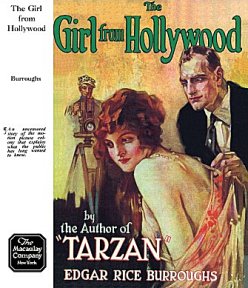
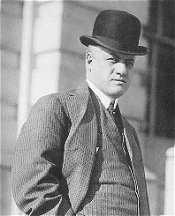
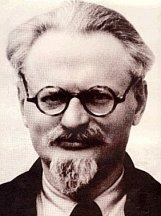
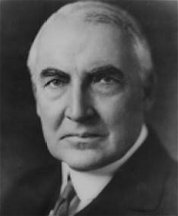
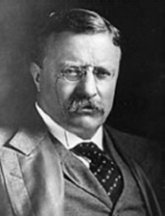
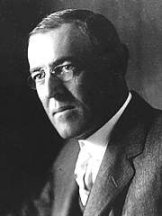
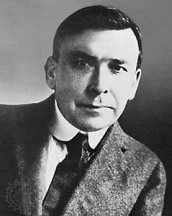
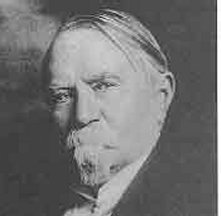
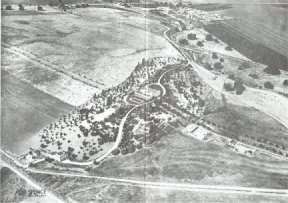
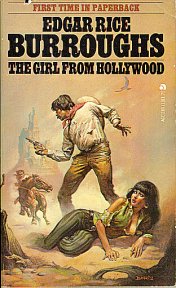
![]()
![]()
![]()
![]()
![]()

![]()